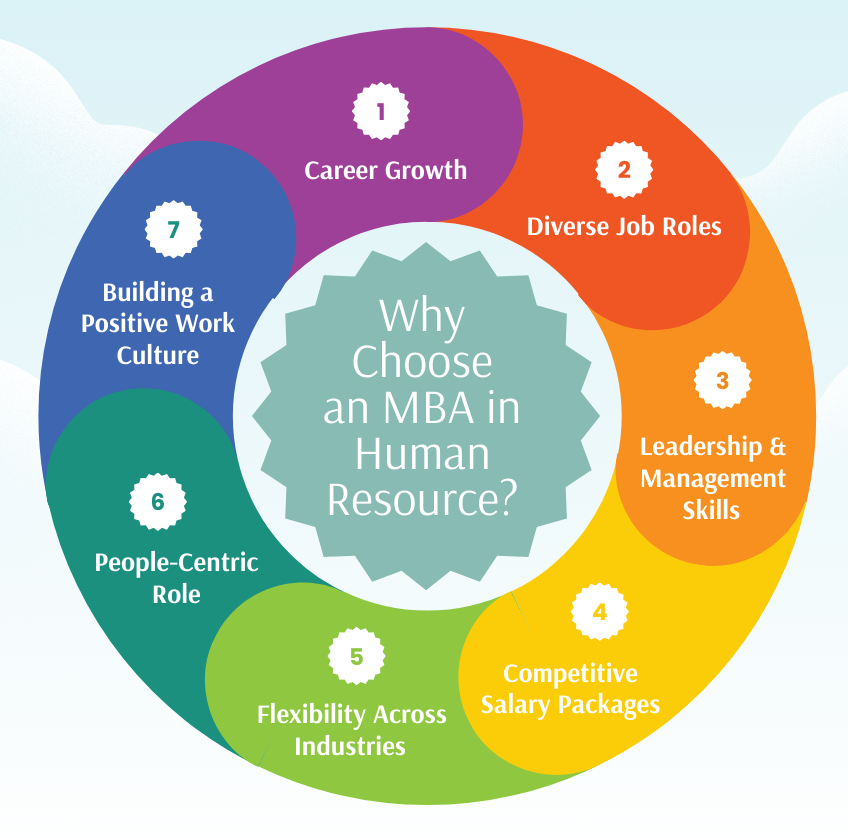Why MBA in HR Management? Career Growth, Opportunities, and Benefits
Table of Contents

What makes a company successful? Well, it’s employees, right? The company’s success or failure can be determined by the quality of its employees. This is why they are considered an irreplaceable asset for any organization. And to be honest, those days are gone when employees were just considered resources to be used for profit; now they are valuable human resources that help drive success.
Many companies still believe in the importance of hiring, training, and effectively managing the right talents. And this change in perception has also highlighted the importance of a human resource manager who helps easily navigate the complexities of human resources. Therefore, if you believe you would excel as an HR manager, pursuing an MBA in HR Management could lead to a fulfilling career, providing you with the necessary skills and knowledge to ascend the corporate success ladder.
In this blog, we will talk about the career growth, opportunities, and benefits of an MBA in HR Management. So, stay tuned with us to grab the latest information.

*shooliniuniversity
Top MBA in HR Management Job Opportunities
Pursuing an MBA in HR Management opens the door not only to a degree but also to wealth in career opportunities. Human resources, as a field, is abundant and creates an excellent opportunity for professionals to showcase their creativity and leadership talents in an organization. Here is a look at the top ten careers in the scope of MBA in HR Management, each with unique challenges and rewards:
1. Human Resource Director
As Human Resource Director, you will guide the HR strategy of the organization. This position will involve oversight of the HR department as a whole, development of thorough policies, and introduction of programs that align with the company’s and organization’s goals and objectives set forth by executive order.
HR Directors are the key players at the executive decision-making table, where the overall direction of the organization is set in place. Your leadership and strategic vision will form the backbone to grow a strong organizational culture and enhance employee engagement.
Approximate Salary: ₹20 lakh – ₹50 lakh per annum
2. Talent Acquisition Manager
Talent acquisition refers to the process of finding and hiring the best candidates for an organization. The job includes developing innovative recruiting strategies, working on a recruitment cycle that includes interviewing, and managing the entire hiring process. You will work side by side with department heads to understand what they require for staffing and to ensure they only hire the qualified, competent people. You’ll be responsible for guiding the company in shaping the workforce that will bring it to the next level.
Approximate Salary: ₹8 lakh – ₹18 lakh per annum
3. Staffing Director
The Staffing Director will lead the entire recruitment process, from identifying recruitment needs and sourcing candidates to conducting interviews and ensuring that the organization retains top talent. Their role is vital to fulfilling the company’s requirements in terms of staffing. They will also develop strategies for keeping the best employees within the organization.
Approximate Salary: ₹6.5 lakh – ₹9 lakh per annum
4. Human Resource Manager
The Human Resource Managers are considered the backbone of any HR department. These individuals handle other important functions, like hiring, training, performance reviews, and employee retention strategies. You’ll be responsible for creating a pleasant work atmosphere and making sure employees are engaged and motivated. Your skills with the management of very complicated HR issues combine to facilitate the goals and objectives of the organization.
Approximate Salary: ₹2.8 lakh – ₹19 lakh per annum
5. Employee Relations Manager
In the role of Employee Relations Manager, your focus will be on maintaining positive relationships between employers and employees. You will address disputes and work to ensure a harmonious work environment. This position requires strong conflict resolution skills and a profound understanding of labor laws and regulations. Your efforts will help create a workplace culture that values open communication and mutual respect.
Approximate Salary: ₹4 lakh – ₹13 lakh per annum
6. Human Resource Analyst
If you have a passion for data, the role of HR Analyst might be the perfect fit for you. In this position, you will analyze employee performance data to help improve decision-making and efficiency within the HR department. Your analytical skills will enable you to provide insights that drive strategic HR initiatives, ultimately contributing to the organization’s success. This role often involves using various HR software and tools to generate reports and track key metrics.
Approximate Salary: ₹4 lakh – ₹7 lakh per annum
7. Technical Recruiter
If you have a passion for technology, apply for the position of Technical Recruiter. Your role would be to align candidates for technical roles within your organization. This task would require a thorough understanding of the technical needs for various job openings and the ability to ensure the fitness of candidates for these roles during assessments. Your expertise would be of great importance to build up a good technical team to ensure innovation and success.
Top 6 Benefits of an MBA in Human Resources
Pursuing an MBA in Human Resources means much more than just taking a step towards getting a high-paying job; it is an investment for your future with ample benefits that can enhance your career at various stages. Whatever your career goals, an MBA in HR Management will give you the skills and knowledge you need to succeed in the ever-changing workplace. Here are the top six advantages of earning this degree of outstanding value:
1. Gain Broad Knowledge of Business Strategy
One of the standout features of an MBA in HR Management is its comprehensive curriculum that spans management, strategy, and operations. This multifaceted approach equips you with a holistic understanding of how businesses operate. You’ll learn to align HR strategies with overall business goals. This makes you a key player in the success of the organization. This knowledge is particularly beneficial when collaborating with other departments, as it enables you to contribute meaningfully to cross-functional teams.
2. Learn to Create Effective Talent Management Programs
In today’s world, having talent is a key success factor for every organization. An MBA in Human Resources aims mainly at delving deeply into the strategies for hiring, developing, and retaining top talent. You’ll learn how to create effective talent management programs that will help foster employee growth and engagement. This in-depth focus sets you apart and ahead of other MBA graduates who, at the most, have only skimmed through HR topics.
3. Build Change Management Skills
Changes, indeed, are an inevitable reality of every organization, especially in today’s world of technological advancements and variable competitive trends. You see change management processes that minimize disruption while dynamically helping people adjust to new processes, technologies, or organizational structures. Such a skill propels you into a standout leader that can successfully carry a team through the fires of uncertainty, instilling and improving performance and morale. Your real gift in leading through change can greatly enhance either the way an organization manages adaptation or the way it motivates itself.
4. Understand Legal and Compliance Issues
Navigating the complexities of employment law and compliance is essential for any HR professional. An MBA in HR Management provides a solid foundation in legal principles, helping you understand the nuances of labor laws and regulations that impact your organization. This knowledge is crucial for developing policies that protect both the company and its employees. By being well-versed in legal issues, you can ensure that your organization adheres to compliance standards, thereby reducing the risk of legal disputes and fostering a fair workplace. This expertise enhances your credibility and positions you as a trusted advisor within your organization.
5. Prepare for Leadership Positions
In many organizations, holding an MBA is often a prerequisite for climbing to executive leadership roles. This degree equips you with the advanced skills necessary for effective people management and strategic decision-making. You’ll gain insights into leadership styles, organizational behavior, and conflict resolution, all of which are essential for guiding teams and driving organizational change.
6. Increase Your Earning Potential
One of the most compelling reasons to pursue an MBA in HR Management is the significant increase in earning potential it offers. According to recent statistics, mid- to senior-level HR jobs requiring an MBA have a median salary of around $116,000, compared to $90,500 for those with just a bachelor’s degree. This substantial salary gap highlights the return on investment that an MBA provides.
Key Subjects and Curriculum Components of an MBA in HR Management
An MBA in HR Management combines foundational management courses with specialized HR subjects, ensuring you’re well-prepared for today’s complex HR landscape. Here’s a breakdown of how the curriculum supports your career progression:
Foundational Management Courses
These essential courses provide a broad understanding of business concepts crucial for any leadership role, including HR.
- Strategic Management: Learn to formulate long-term business strategies, aligning HR functions with overall goals.
- Marketing Management: Understand how marketing strategies support business objectives, helping HR to effectively attract and engage talent.
- Financial Accounting and Management: Gain insights into financial data, crucial for making informed decisions about budgets and compensation.
- Operations Management: Learn how to optimize business processes, which translates into efficient HR operations.

How Can Jaro Education Help You Achieve Career Growth With an MBA in HR Management?
Jaro Education, a leading online education and upskilling platform in India, serves a global community of over 350,000 learners. The organization offers a comprehensive portfolio of more than 150 courses across diverse academic disciplines and is committed to facilitating professional development and career advancement.
Recommended Courses
Personalized Career Counseling
To ensure you’re on the right track, we offer free one-on-one career counseling sessions with experts.
Continuous Learning
To stay ahead in your field, explore our collection of articles related to MBA topics, offering insights that can enrich your knowledge and career.
Conclusion
An MBA in HR Management is not just a degree; it’s a gateway to numerous career opportunities and personal growth. However, the MBA in HR management fees can vary from university to university. If you are keen to learn more about the fee structure, consult the team of Jaro Education. With the right education and resources, you can significantly enhance your career trajectory and make a lasting impact in the world of human resources.
Frequently Asked Questions
What are the pros of getting an MBA in HR?
An MBA in HR goes beyond surface-level understanding of human resources. It offers research-backed, tactical knowledge on hiring, developing, and retaining top talent. These skills are crucial for setting your company apart in a competitive landscape.
Why did you choose an MBA in HR?
An MBA in HR provides a clear career path with a focus on people management within organizations. The program offers essential skills in talent acquisition, employee relations, and training and development, as well as strategic insight on aligning HR with overall business goals. This combination paves the way for career growth and leadership opportunities in HR.
What is the scope of an MBA in HR in the future?
The demand for MBA in HR graduates continues to grow across various sectors, including BPOs, corporate environments, and service industries. Every organization, whether large or small, requires skilled HR professionals. Moreover, HR specialists are increasingly sought after in the education sector, working for universities, colleges, and technical institutions to manage hiring processes and maintain employment records.
What job opportunities can I pursue after an MBA in HR?
With an MBA in HR, you can explore several exciting career opportunities, such as:
- Recruiter: Responsible for sourcing and selecting candidates, ensuring that the organization attracts the best talent.
- Talent Acquisition Specialist: Focuses on developing and executing recruitment strategies to fill open positions.
- Staffing Specialist: Manages the hiring process, representing the organization in talent sourcing efforts.






![Best-IIM-Online-Courses-with-Certification-[2025]](https://jaro-website.s3.ap-south-1.amazonaws.com/2025/04/Best-IIM-Online-Courses-with-Certification-2025-1024x576.webp)









